The research reported here was funded in part by the Minerva Research Initiative (OUSD(R&E)) and the Army Research Office/Army Research Laboratory via grant #W911-NF-17-1-0569 to George Mason University. Any errors and opinions are not those of the Department of Defense and are attributable solely to the authors.
The Biden administration’s decision to withdraw all U.S. troops from Afghanistan by September 11, 2021 is a wise strategic choice that took significant political courage. The administration correctly assessed that perpetuating U.S. military engagement in Afghanistan has become a strategic liability and a futile investment that lost the capacity to alter the basic political and military dynamics in Afghanistan. That does not mean that desirable political and security developments will follow in Afghanistan after the U.S. military withdrawal. Unfortunately, the possibility of an intensified and potentially highly fragmented and bloody civil war is real, and at minimum, the Taliban’s ascendance to formal power will bring painful changes to the country’s political dispensation.
The basic wisdom of the administration’s decision is the realization that perpetuating U.S. military engagement would not reverse these dynamics and that U.S. military, financial, diplomatic, and leadership resources would be better spent on other issues. Even so, the administration made some serious tactical mistakes in its announcement.
Strategic priorities and liabilities
The U.S. primary objective in Afghanistan since 2001 has been to degrade the threat of terrorism against the United States and its allies. That basic goal was accomplished a decade ago: Al-Qaida’s capabilities are a fraction of what they used to be. The Islamic State in Khorasan (ISK) continues to operate in Afghanistan, but the Taliban has been fighting ISK assiduously. However, perpetually bad governance in Afghanistan has undermined stability and allowed the Taliban to entrench itself. While the Taliban too is implicated in many illicit economies, it is often seen as less predatory and capricious, even if brutal and restrictive, than powerbrokers associated with the Afghan government.
The Biden administration correctly assessed that the threat of terrorism from Afghanistan today is in fact smaller than from various parts of Africa and the Middle East. In Somalia, for example, al-Shabab’s territorial and governing power are steadily increasing and the group retains a strong allegiance to al-Qaida. The Islamic State (ISIS) in Somalia, while much weaker than al-Shabab, retains persistent capacity. Various al-Qaida and ISIS affiliates robustly operate in Mali and other parts of the Sahel and North Africa. Thus, even though the Taliban is unwilling to sever its connections with al-Qaida, that threat is not radically different from the terrorist threats against the United States and our allies emanating from other locales. Though hopefully the U.S.-Taliban Doha agreement from February 2020 will incentivize the Taliban to prevent al-Qaida from taking actions against the United States and its allies from Afghanistan, and ongoing U.S. policy should be geared toward this objectives through diplomacy, conditional aid and sanctions, and, even, possibly occasional strikes from off-shore.
Moreover, U.S. veterans of such frustrating unending wars are an important source of right-wing armed recruitment in the United States and the threat to public safety, democracy, and rule of law those groups pose here. By minimizing such U.S. military engagements abroad, the United States is taking a step in addressing this important danger.
The Biden administration’s political courage lies in its refusal to be cowed by the possibility that a terrorism threat will grow in Afghanistan after the U.S. withdrawal. That specter has been a key justification for militarily staying on and on. That possibility needs to be weighed against other already materialized strategic threats and realities. Indeed, another wise aspect of the Biden administration’s decision was to stop treating U.S. Afghanistan policy in isolation from other issues and strategic priorities; to date, the tyranny of sunk costs has inflated Afghanistan’s importance.
Now, threats from China, an aggressive Russia, North Korea, and Iran — as well as zoonotic pandemics — are more important strategic priorities. Investing in U.S. Special Operation Forces, top leadership attention, and financial resources to counter those threats can deliver far greater strategic benefits than perpetuating the Afghanistan military effort.
The hard ground realities in Afghanistan
The United States hasn’t achieved its goal of defeating the Taliban. For several years, the Taliban has been steadily ascendant on the battlefield. It is on a path to become the strongest political force in Afghanistan, and a powerful actor in a future Afghan government.
Continuing the U.S. deployment won’t alter this reality. There is no credible path whereby a sustained U.S. troop presence helps bring a desirable peace deal — “desirable” defined as a Colombia-like deal, with minimal political representation for the Taliban in national and subnational government, an amnesty, and fighter demobilization and reintegration assistance. In Colombia, the war was stalled at a much lower level of conflict when negotiations with the leftist guerrillas began, and the basic trends for the Revolutionary Armed Forces of Colombia (FARC) were headed downward. The opposite is the case in Afghanistan, where Afghan security forces by and large remain weak, often reach accommodation with the Taliban, and suffer from many deficiencies.
The U.S. military presence has slowed the Taliban’s military and political gains, but not reversed them (even when American troop levels were 100,000 strong). It has no prospect of accomplishing them with 5,000 or 10,000 troops staying for another five or 10 years, let alone less. Since 2015, the U.S. approach to Afghanistan has been staying and praying — praying that the Taliban will make enough strategic mistakes to do itself in on the battlefield. It has not.
Nor has the United States managed to redress another key malady of Afghanistan: the perpetually parochial, fractious, and corrupt political elite, which engages in disruptive politicking instead of governing, even as Afghanistan has burned in an intensifying insurgency. Neither U.S. and international donor threats to reduce aid nor the ever-clearer and nearer prospect of the U.S. military withdrawal have swayed politicians toward unity against the Taliban and fundamentally improved governance.
Moreover, sustaining a U.S. military deployment in Afghanistan until a peace deal is reached would neglect the fact that any serious negotiations amidst the ground realities require the Afghan government to cede a considerable amount of power to the Taliban. The Afghan government has naturally not wanted to do so, and thus had had no interest in seriously negotiating with the Taliban. As long as there was a prospect for the United States staying militarily and propping up the Afghan government, Kabul has had little incentive to negotiate. Conversely, a firm U.S. withdrawal date — which Trump and now Biden have declared —incentivizes the Taliban not to negotiate until after U.S. troops are gone and the Taliban gains more power.
Supporters of a sustained presence point out that the U.S. withdrawal is abrupt; rather, Washington has repeatedly and ever more strongly signaled it over a decade. In 2014, for instance, the Obama administration was on the verge of going merely to an embassy-level military presence. But the Afghan government and political elites have ignored the steady warnings, hoping instead to entangle the United States with an open-ended military commitment until the Taliban was much weakened, however many years or decades that would take.
NATO and Pakistan
Even though the writing has been on the wall, the U.S. decision creates discomfort for some European allies — a poignant and ironic disparity in policy preferences. For years, the United States had been urging NATO allies under the International Security Assistance Force (ISAF) to devote greater military forces to Afghanistan and to leave their bases to engage in offensive counterinsurgency actions, even though Washington originally sold the Afghanistan mission to them as one of defensive patrolling, state-building, and economic development. Watching allies’ restrictive battlefield rules of engagement made U.S. soldiers joke bitterly that ISAF stood for “I Saw America Fight,” while U.S. troops slugged out in hard firefights in remote forward operating bases.
Yet while NATO partners are dependent on the United States for intelligence, surveillance, and reconnaissance and logistics — and thus are most unlikely to maintain a military presence in Afghanistan beyond the U.S. withdrawal — they now fear the withdrawal. The likely deterioration of security and political dispensation in Afghanistan creates serious domestic political problems for them, as does the prospect of Afghan refugees. But extending the withdrawal deadline from May 1 to September gives the NATO partners a chance to manage an orderly lift out from Afghanistan.
With Pakistan, U.S. policy can move toward more normalization. At a minimum, the withdrawal of U.S. forces from Afghanistan will liberate the United States from dependence on ground and air lines of control to Afghanistan through Pakistan. This dependence has been holding other elements of U.S. Pakistan policy hostage, including concerns about tactical nuclear weapons, civil-military relations, and democracy.
The bleak outlook in Afghanistan
The political prospects in Afghanistan are not pretty. At best, the existing civil war, killing tens of thousands of Afghans annually, will eventually ease. But the Taliban is heading to power and the new political dispensation will mean a significant weakening of political and human rights, civil liberties, and pluralistic processes.
The Taliban continues to object to elections, at least elections that could remove it from power. Instead, it embraces an Iran-like model of a supreme religious council where the Taliban is the strongest actor, ruling over other political and administrative structures where elections can take place.
Understandably, the Taliban also wants to integrate its fighters into the Afghan military and intelligence services — whether or not the Afghan security forces have significantly collapsed beforehand. Already, the Taliban encircles at least 12 provincial capitals, and without the U.S. air power holding back its offensives, the Taliban can pounce on and hold many of them. Worse yet, the existing civil war can easily intensify into a far bloodier, fragmented, and protracted one (à la Syria or Libya) before the Taliban arrives in power, for who knows how long.
All of these likely losses to democratic processes, rights, and humanitarian concerns are immensely tragic. But the United States could no longer reverse them.
All of these likely losses to democratic processes, rights, and humanitarian concerns are immensely tragic. But the United States could no longer reverse them.
A major tactical error and way forward
Although correct in its basic strategic decision, the Biden administration nonetheless made a major tactical error: In announcing the new withdrawal timeline just a few days before a planned Istanbul conference on Afghanistan, it undercut peace diplomacy. The conference — which sought an interim peace agreement between the Ashraf Ghani government and the Taliban, against the two sides’ preferences — had been a major diplomatic stretch. The United States and the international community put a lot of diplomatic capital into a rushed and undercooked effort, further weakening the embattled Afghan government and augmenting the fractious tendencies among the Afghan elite.
Managed differently, the conference could have generated a new negotiating process, complementing the moribund Doha peace negotiations between the Afghan government and the Taliban. Unsurprisingly, the Taliban said this week that it would not engage in any peace conference until after all international troops are out of Afghanistan. This U.S. tactical error is costly for future American and international diplomatic efforts in Afghanistan.
The United States needs to remain engaged in those efforts and continually urge power-sharing in Afghanistan. It should continue providing financial, intelligence, and perhaps other remote support for the Afghan security forces. It should seek to shape the Taliban through prospects of international economic aid (or its denial), sanctions, travel visas, and other tools so as to minimize the losses to pluralistic political and economic processes and rights in Afghanistan. Those losses are coming, but we should try to reduce their extent. The United States should also mitigate humanitarian consequences, including by providing visas to Afghans who collaborate in the U.S. effort.
Despite the inglorious departure, having the wisdom to liquidate unwise commitments and redirect resources toward more important priorities is a basic hallmark of a great power, and to the credit of the Biden administration.

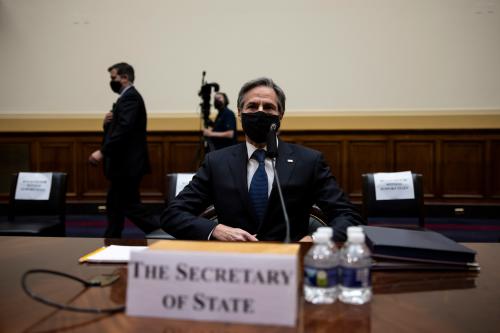
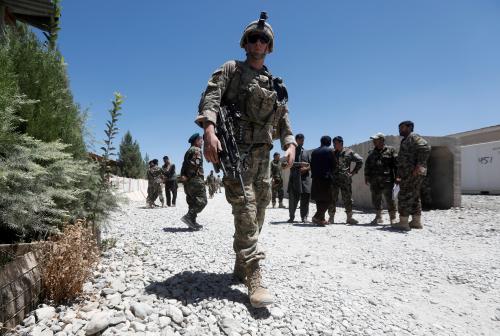
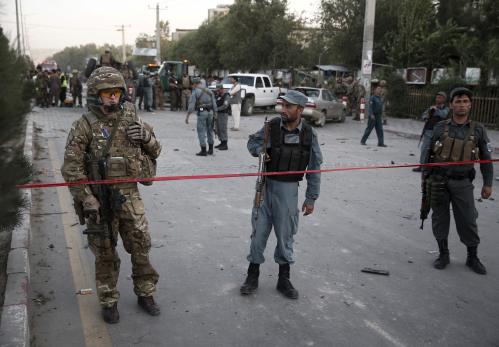

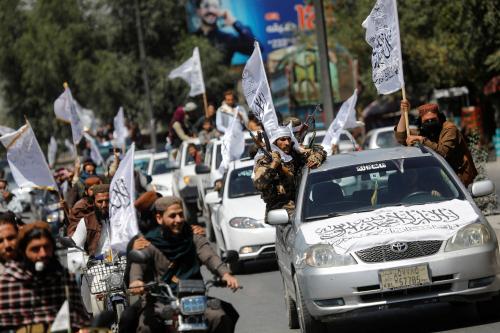
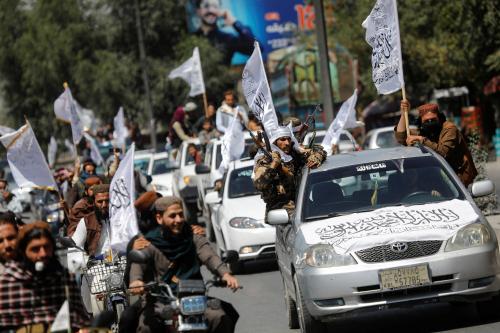
Commentary
The US decision to withdraw from Afghanistan is the right one
April 15, 2021